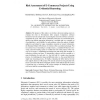88 search results - page 4 / 18 » A Completeness Result for Reasoning with Incomplete First-Or... |
DLOG
2011
12 years 10 months ago
2011
This paper introduces relaxed abduction, a novel non-standard reasoning task for description logics. Although abductive reasoning over description logic knowledge bases has been ap...
LPNMR
2004
Springer
13 years 12 months ago
2004
Springer
Abstract. We present a logic programming based conditional planner that is capable of generating both conditional and sequential conformant plans in the presence of sensing actions...
IJCAI
2003
13 years 8 months ago
2003
Query answering over commonsense knowledge bases typically employs a first-order logic theorem prover. While first-order inference is intractable in general, provers can often b...
FSKD
2006
Springer
13 years 10 months ago
2006
Springer
The purpose of this study is to develop a decision making system to evaluate the risks in E-Commerce (EC) projects. Competitive software businesses have the critical task of assess...
PODS
2011
ACM
12 years 9 months ago
2011
ACM
In the traditional data exchange setting, source instances are restricted to be complete in the sense that every fact is either true or false in these instances. Although natural ...


